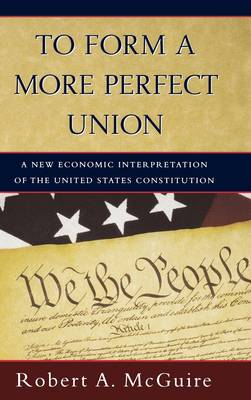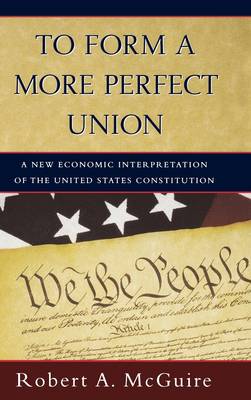
Door een staking bij bpost kan je online bestelling op dit moment iets langer onderweg zijn dan voorzien. Dringend iets nodig? Onze winkels ontvangen jou met open armen!
- Afhalen na 1 uur in een winkel met voorraad
- Gratis thuislevering in België vanaf € 30
- Ruim aanbod met 7 miljoen producten
Door een staking bij bpost kan je online bestelling op dit moment iets langer onderweg zijn dan voorzien. Dringend iets nodig? Onze winkels ontvangen jou met open armen!
- Afhalen na 1 uur in een winkel met voorraad
- Gratis thuislevering in België vanaf € 30
- Ruim aanbod met 7 miljoen producten
Zoeken
To Form a More Perfect Union
A New Economic Interpretation of the United States Constitution
Robert A McGuire
Hardcover | Engels
€ 166,45
+ 332 punten
Omschrijving
Many important questions regarding the creation and adoption of the United States Constitution remain unresolved. Did slaveholdings or financial holdings significantly influence our Founding Fathers' stance on particular clauses or rules contained in the Constitution? Was there a division of support for the Constitution related to religious beliefs or ethnicity? Were founders from less commercial areas more likely to oppose the Constitution? To Form a More Perfect Union successfully answers these questions and offers an economic explanation for the behavior of our Founding Fathers during the nation's constitutional founding.
In 1913, American historian Charles A. Beard controversially argued in his book An Economic Interpretation of the Constitution of the United States that the framers and ratifiers of the Constitution were less interested in furthering democratic principles than in advancing specific economic and financial interests. Beard's thesis eventually emerged as the standard historical interpretation and remained so until the 1950s. Since then, many constitutional and historical scholars have questioned an economic interpretation of the Constitution as being too narrow or too calculating, believing the great principles and political philosophies that motivated the Founding Fathers to be worthier subjects of study.
In this meticulously researched reexamination of the drafting and ratification of our nation's Constitution, Robert McGuire argues that Alexander Hamilton, James Madison, George Mason and the other Founding Fathers did act as much for economic motives as for abstract ideals. To Form a More Perfect Union offers compelling evidence showing that the economic, financial, and other interests of the founders can account for the specific design and adoption of our Constitution. This is the first book to provide modern evidence that substantiates many of the overall conclusions found in Charles Beard's An Economic Interpretation while challenging and overturning other of Beard's specific findings. To Form a More Perfect Union presents an entirely new approach to the study of the shaping of the U.S. Constitution. Through the application of economic thinking and rigorous statistical techniques, as well as the processing of vast amounts of data on the economic interests and personal characteristics of the Founding Fathers, McGuire convincingly demonstrates that an economic interpretation of the Constitution is valid. Radically challenging the prevailing views of most historians, political scientists, and legal scholars, To Form a More Perfect Union provides a wealth of new findings about the Founding Fathers' constitutional choices and sheds new light on the motivations behind the design and adoption of the United States Constitution.
In 1913, American historian Charles A. Beard controversially argued in his book An Economic Interpretation of the Constitution of the United States that the framers and ratifiers of the Constitution were less interested in furthering democratic principles than in advancing specific economic and financial interests. Beard's thesis eventually emerged as the standard historical interpretation and remained so until the 1950s. Since then, many constitutional and historical scholars have questioned an economic interpretation of the Constitution as being too narrow or too calculating, believing the great principles and political philosophies that motivated the Founding Fathers to be worthier subjects of study.
In this meticulously researched reexamination of the drafting and ratification of our nation's Constitution, Robert McGuire argues that Alexander Hamilton, James Madison, George Mason and the other Founding Fathers did act as much for economic motives as for abstract ideals. To Form a More Perfect Union offers compelling evidence showing that the economic, financial, and other interests of the founders can account for the specific design and adoption of our Constitution. This is the first book to provide modern evidence that substantiates many of the overall conclusions found in Charles Beard's An Economic Interpretation while challenging and overturning other of Beard's specific findings. To Form a More Perfect Union presents an entirely new approach to the study of the shaping of the U.S. Constitution. Through the application of economic thinking and rigorous statistical techniques, as well as the processing of vast amounts of data on the economic interests and personal characteristics of the Founding Fathers, McGuire convincingly demonstrates that an economic interpretation of the Constitution is valid. Radically challenging the prevailing views of most historians, political scientists, and legal scholars, To Form a More Perfect Union provides a wealth of new findings about the Founding Fathers' constitutional choices and sheds new light on the motivations behind the design and adoption of the United States Constitution.
Specificaties
Betrokkenen
- Auteur(s):
- Uitgeverij:
Inhoud
- Aantal bladzijden:
- 416
- Taal:
- Engels
Eigenschappen
- Productcode (EAN):
- 9780195139709
- Verschijningsdatum:
- 27/03/2003
- Uitvoering:
- Hardcover
- Formaat:
- Genaaid
- Afmetingen:
- 167 mm x 248 mm
- Gewicht:
- 730 g

Alleen bij Standaard Boekhandel
+ 332 punten op je klantenkaart van Standaard Boekhandel
Beoordelingen
We publiceren alleen reviews die voldoen aan de voorwaarden voor reviews. Bekijk onze voorwaarden voor reviews.











